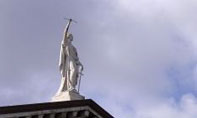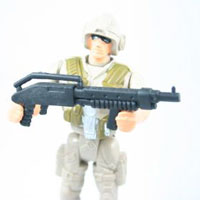- About Us
- Columns
- Letters
- Cartoons
- The Udder Limits
- Archives
- Ezy Reading Archive
- 2024 Cud Archives
- 2023 Cud Archives
- 2022 Cud Archives
- 2021 Cud Archives
- 2020 Cud Archives
- 2015-2019
- 2010-2014
- 2004-2009
 |
The BBC...Fair and Balanced? |
Often people, especially Americans, tell me that they watch BCC because they know it to be more impartial than most other news networks.
The Americans generally say this with pride, because they know that watching a foreign news channel places them in a select group of thinking Americans who have seen past Fox's slogan and who know their coverage to be neither fair nor balanced.
The BBC certainly is much more impartial than Fox, CNN, or Sky, but is it actually impartial? Today I saw a report, actually I saw the same report about 12 times, repeated every fifteen minutes or half an hour in slightly different words, about Bush's speech before the US military to mark the one year anniversary of the return of power to the Iraqis. The style of the reporting was indeed impartial. Bush's speech was synopsised, the main ideas of it expressed clearly. According to Bush, Iraq is centre stage in the war on terrorism, and the insurgents are comparable to those people who hijacked those planes on that day that changed all our lives. The BBC (I say BBC, not reporter, since I saw very similar reports read by different presenters) also discussed some of the possible hidden intentions of Bush's speech. Bush may be worried about his legacy, since many Americans have begun to suspect that he may not have been completely honest with them when he lead the country to war. Many Americans no longer support the presence of US troops in Iraq and would like Bush to find an exit strategy, so he needs to convince them that troops should stay. I guess 'exit strategy' means getting out without losing too much face. Nixon accomplished this admirably with regard to Vietnam, calling it an honourable withdrawal. After ten years of trying both openly and clandestinely to take control of the region, after killing an estimated 4-5 million people (That Many? Wow, that's like nine-eleven times one thousand, five hundred and twenty-two), after destroying much of the region's crops and forests with experimental chemical weapons of mass destruction, Nixon realised that the only way the US could win the war would be to kill every man, woman and child. He decided to withdraw the troops instead. That was honourable.
The BBC (I say BBC, not reporter, since I saw very similar reports read by different presenters) also discussed some of the possible hidden intentions of Bush's speech. Bush may be worried about his legacy, since many Americans have begun to suspect that he may not have been completely honest with them when he lead the country to war. Many Americans no longer support the presence of US troops in Iraq and would like Bush to find an exit strategy, so he needs to convince them that troops should stay. I guess 'exit strategy' means getting out without losing too much face. Nixon accomplished this admirably with regard to Vietnam, calling it an honourable withdrawal. After ten years of trying both openly and clandestinely to take control of the region, after killing an estimated 4-5 million people (That Many? Wow, that's like nine-eleven times one thousand, five hundred and twenty-two), after destroying much of the region's crops and forests with experimental chemical weapons of mass destruction, Nixon realised that the only way the US could win the war would be to kill every man, woman and child. He decided to withdraw the troops instead. That was honourable.
The BBC's reporting of the speech, and the possible intentions behind it was factual, but there were a couple of things which lead me to think that the end result of their report is not a balanced view of the situation. In essence, it comes down to the terms used by the BBC. First, the "handover" of power. How many independent countries have more than one hundred thousand of a foreign power's troops in their country, who operate under the direct command of that power and are allowed to operate outside the law of the country where they are stationed? One must question whether or not real authority has been restored to the Iraqi people. A truly impartial news story might make mention of something about the validity of this 'handover" on its one-year anniversary.
Next come the "insurgents" and "terrorists". Almost two and a half years ago the US launched an invasion of a sovereign country. Perhaps surprisingly, many people living in that country took issue with the idea of being invaded. They didn't realise that the bombs that were destroying their homes were actually liberating them. Many of these people decided to resist the US invasion, but their government fell and suddenly they became "insurgents" and "terrorists". These people didn't realise that might is right. They didn't realise that if another power succeeds in toppling your government, you must accept it, and any resistance to this power is the same as terrorism. Since the US commenced the invasion, there has been constant resistance. The same people have been fighting for the same reason, except something has changed. They are no longer resisting foreign invasion, now they are "insurgents" and "terrorists" who hate us for our freedom. I wonder whether these people realise the change they've undergone. When the BBC, or pretty much any other major English language news organisation refers to these people, it is as "insurgents". Although these people haven't actually changed in their intent at all, the media has changed them by accepting the term 'insurgents' and using it consistently.
The BBC informs us that Bush said the Iraq war is the centre-piece in the war on terror. Bush did indeed say that. But is Iraq the centre piece on the war on terror? Funnily enough, it actually is if one sees the US government as the terrorists and the "insurgents" as the ones fighting the war on terror, but I don't think Bush meant that. The BBC says nothing of the validity of the claim, they just pass on Bush's message. For many casual viewers, the claim becomes true. Again, whilst the BBC's coverage was factual in its coverage of the speech, the fact that they accept and use the terms that Bush and the US government use, leads the viewer to have an unbalanced view of the situation. Iraq is free and independent, and any Iraqi who doesn't agree is a "terrorist insurgent."
